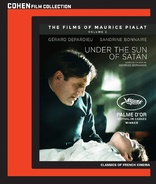Under the Sun of Satan: The Films of Maurice Pialat: Volume 2 Blu-ray Movie
HomeUnder the Sun of Satan: The Films of Maurice Pialat: Volume 2 Blu-ray Movie 
Sous le soleil de SatanCohen Media Group | 1987 | 93 min | Not rated | Jun 14, 2016
Movie rating
6.7 | / 10 |
Blu-ray rating
| Users | 0.0 | |
| Reviewer | 3.5 | |
| Overall | 3.5 |
Overview
Under the Sun of Satan: The Films of Maurice Pialat: Volume 2 (1987)
Donissan is a self-abasing curate tortured by questions about his role in God’s plan — before an encounter with a material Satan touches off a powerful revelation. At the crux of his vision is Mouchette, the madly profligate sylph whose fate ruptures in a blast of gunpowder and the slash of a razor. As events unfurl, the director himself provides witness as Menou-Segrais the seasoned cleric who pronounces the words: “God wears us down.”
Starring: Gérard Depardieu, Sandrine Bonnaire, Maurice Pialat, Alain Artur, Yann DedetDirector: Maurice Pialat
| Foreign | 100% |
| Drama | 40% |
Specifications
Video
Video codec: MPEG-4 AVC
Video resolution: 1080p
Aspect ratio: 1.66:1
Original aspect ratio: 1.66:1
Audio
French: Dolby Digital 2.0
Subtitles
English
Discs
50GB Blu-ray Disc
Two-disc set (2 BDs)
Packaging
Slipcover in original pressing
Playback
Region A, B (C untested)
Review
Rating summary
| Movie | 3.5 | |
| Video | 4.5 | |
| Audio | 3.0 | |
| Extras | 3.0 | |
| Overall | 3.5 |
Under the Sun of Satan: The Films of Maurice Pialat: Volume 2 Blu-ray Movie Review
Reviewed by Jeffrey Kauffman June 15, 2016Maurice Pialat claimed to be an atheist, but if one takes Under the Sun of Satan’s title (let alone elements of its plot) at face value, one could make an appealing argument that the French writer-director at least flirted with Gnosticism. Perhaps because I personally grew up with an almost absurd amount of differing religious influences, I’ve always been fascinated by how various cultures respond to the “big questions” of existence, including (not to be too facile about it) why we even exist in the first place, and (to get right down to brass tacks) why bad things happen on the material plane. The Gnostics at least had a reasonable answer for the second issue, if not the first, positing that the physical world was under the domain of a so-called demiurge, a kind of lower level deity who, if not exactly the Christian conception of Satan, is close enough for jazz. The fact that Pialat proffers a supposedly “heavenly” orb belonging to the Devil is just one of the subtextual conceits that informs this overtly religious film, one which follows the travails of a rural priest named Father Donissan (Gérard Depardieu), a rustic believer who may not have much intellectual apprehension for the various ins and outs of Catholicism, but who “feels” things at an almost atavistic level. Donissan is given to “old school” practices like self flagellation (in one of Under the Sun of Satan’s most memorable sequences). However, he’s not completely subsumed with issues like the mortification of the flesh, instead having the ability to at least ask those aforementioned big questions, if not similarly being able to come up with any meaningful answers. Under the Sun of Satan is a fascinating film, but it’s not an “easy” watch, for it tends to poke and prod around issues that tend to chafe at people’s sensibilities, whether or not they consider themselves “religious” in the traditional sense. Dense, tending toward the mystical, and at times almost willfully provocative, Under the Sun of Satan is a film that may lead to discomfort, but which may also lead to some intense ruminations on the nature of life, love and, yes, God.
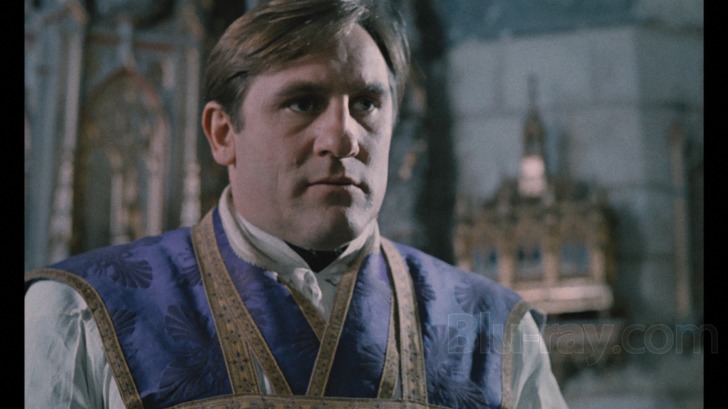
Under the Sun of Satan was culled from a novel by Georges Bernanos, the same author whose work inspired one of the most famous French films about a rural holy man, Robert Bresson’s Journal d'un curé de campagne (Diary of a Country Priest). There’s an at least somewhat similar ambience to both films, if only insofar that a newcomer to a rural village tasked with ministering to the inhabitants may need a bit of counsel himself. Father Donissan is troubled by more than a mere stomach problem, however, and is seemingly beset by a number of roiling psychological issues—and that’s before he is accosted by a vision (or is it?) of Satan himself.
Also somewhat like Diary of a Country Priest, there’s an interesting dialectical relationship between a younger Father and an older one. In this case, Donissan is mentored by a so-called Dean named Menou-Segrais (Maurice Pialat himself, evidently replacing Claude Berri, at least if I’m understanding some of the supplements correctly). The discussions between these two radically different members of the clergy offers near Socratic levels of discourse on various liturgical and ontological issues, though it’s fascinating to see how Pialat attempts to toe a kind of middle ground where he presents obviously opposing viewpoints without really taking a “side”. Donissan’s tendency toward the mystical side of things may make him more prone toward believing in inexplicable “miracles”, though as the film ultimately details, the “miraculous” doesn’t necessarily mean something wonderful.
The film skirts with several issues that are at least tangentially tied to Catholic beliefs which some may find "objectionable" in the current climate of political correctness. Chief among these is probably the implication (if not outright depiction) that this particular Satan seems to be "tempting" this particular Christ surrogate with homosexual overtures, but of course one can also rightly see this as a reflection of Donissan's own questioning identity, one which may include uncertainty about his sexuality. Several commandments are broken in this film, in both small and large ways.
The major subplot in Under the Sun of Satan involves a young woman named Mouchette (Sandrine Bonnaire), a supposedly “simple” rustic whose unexpected pregnancy leads to major tragedy. (Another Bresson film culled from a Bernanos novel, 1967’s Mouchette, shares the character name but is otherwise unrelated to this film.) Mouchette’s traumas of course play directly into Donissan’s questioning, but again Pialat doesn’t offer any overly facile answers, instead leaving his focal Father (and by inference the audience) floundering in a sea of uncertainty. A kind of final plea on the part of Donissan deals directly with a central tenet of Christianity, namely resurrection. Here, Pialat seems to take a more “realistic” approach, offering the kind of admittedly depressive materialism that any believing Gnostic will feel completely at home with.
Note: Don't ask me why, but for some reason back in the nooks and crannies of my increasingly addled memory, I recalled having read an hysterically funny review of this film when it was first released. Luckily, I found it archived online. You can read it here.
Under the Sun of Satan: The Films of Maurice Pialat: Volume 2 Blu-ray Movie, Video Quality 
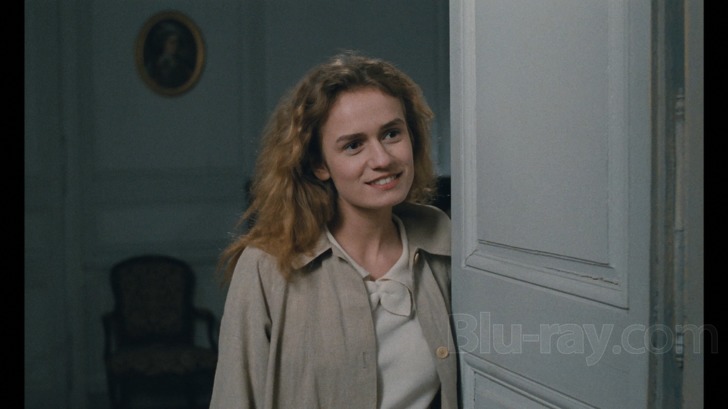
Under the Sun of Satan is presented on Blu-ray courtesy of Cohen Film Collection with an AVC encoded 1080p transfer in 1.66:1. If not absolutely identical with the French release reviewed by Svet Atanasov, this transfer looks substantially similar, at least if going by the admittedly nonscientific pursuit of comparing screenshots. As Svet mentioned, this has a really nice organic appearance, with a naturally resolving grain field and some well above average levels of detail in the blue "temptation" sequence. There are occasional minor deficits in shadow detail and some near crush once or twice (see screenshot 7), but overall the consistent contrast offers excellent detail levels across the board. There are no compression anomalies of any note.
Under the Sun of Satan: The Films of Maurice Pialat: Volume 2 Blu-ray Movie, Audio Quality 
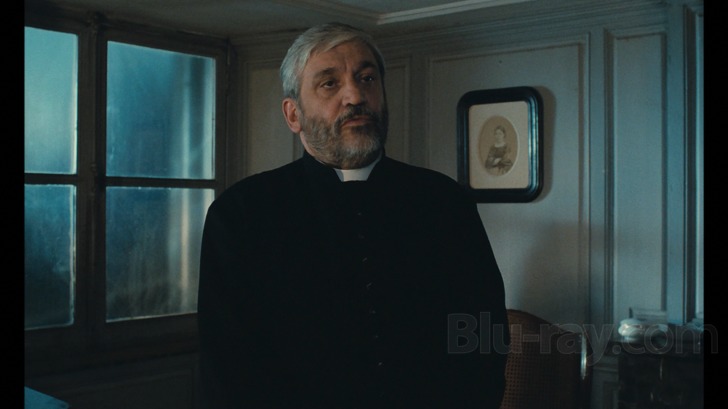
Hey, maybe if I put it in bold someone at Cohen will notice: Cohen, what's up with the lossy audio all of a sudden? As I've been detailing in my last several reviews of Cohen releases, for some reason this niche label which obviously caters to a supposedly more discerning demographic than the "unwashed masses" has only been offering lossy Dolby Digital tracks on its recent releases, something that seems especially odd when one considers that many of these releases have had releases elsewhere that supported lossless audio. Once again this release sports an okay if underwhelming Dolby Digital 2.0 mono track. The "good" news here, if it can be termed as such, is that this film's sonic ambitions are pretty limited, with the bulk of the proceedings playing out in relatively quiet dialogue scenes. As such, the Dolby track "performs", though those interested in this film may want to look at the French release which sports lossless audio.
Under the Sun of Satan: The Films of Maurice Pialat: Volume 2 Blu-ray Movie, Special Features and Extras 
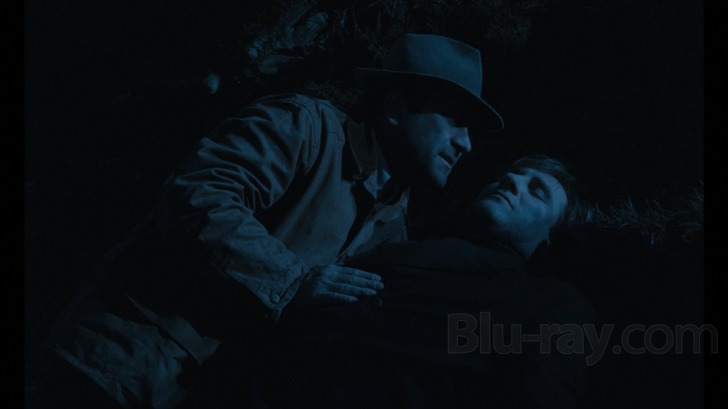
Kind of like the French release of this title, the supplements have been shunted off onto a second disc, though in this case it's a Blu-ray rather than a DVD.
- Interview with Star Gerard Depardieu (1080p; 11:26)
- Interview with Cinematographer Willy Kurant (1080p; 17:05) is an archival piece prefaced by some comments by production designer Katia Wyszkop.
- Interview with Production Designer Katia Wyszkop (1080p; 28:21)
- Deleted Scenes (1080p; 57:29) also includes some interviews with production personnel.
- Behind the Scenes Footage (1080p; 14:34)
- Original Trailer (1080p; 3:35)
- 2015 Re-Release Trailer (1080p; 1:36)
Under the Sun of Satan: The Films of Maurice Pialat: Volume 2 Blu-ray Movie, Overall Score and Recommendation 
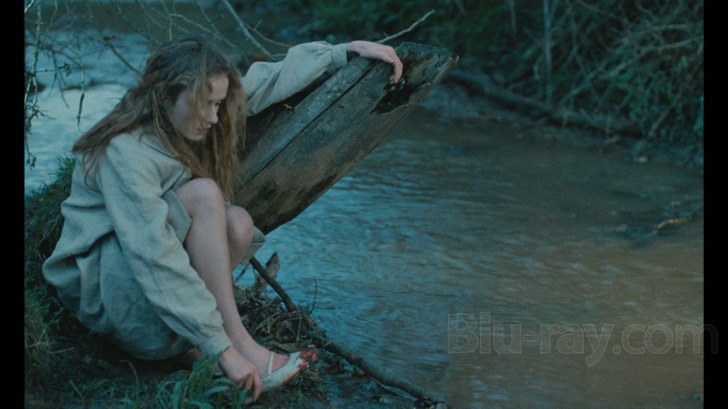
I'm not quite as enamored of Under the Sun of Satan as Svet evidently was, but I'm also not quite at the depths of dismissal that the very funny Washington Post review I linked to was. This is an intentionally thorny (no pun intended) film which is undeniably provocative, and individual reactions to it will probably be based on how tolerant viewers are of religious questioning, peccadilloes and outright sins. Performances are superb throughout, and Pialat crafts a very believable rural environment. The frankly baffling continuance of Cohen to suddenly offer only lossy audio will be a stumbling block for many potential consumers, but with that caveat duly noted, this release comes Recommended.
Similar titles
Similar titles you might also like
(Still not reliable for this title)

Tokyo Twilight
東京暮色
1957

Raise the Red Lantern
Da hong deng long gao gao gua
1991

Killer's Mission
賞金稼ぎ / Shōkin kasegi
1969

The Valley (Obscured by Clouds)
La Vallée
1972

Amore Libero - Free Love
The Real Emanuelle
1974

House of Hummingbird
벌새 / Beol-sae
2019

The Playbirds
1978

Je t'aime moi non plus
I Love You, I Don't
1976

Ophélia
1963

Sound and Fury
1988

El Pico
Overdose
1983

Taxi
2015

Luna
La luna
1979

Himalaya
1999

Home
2008

Pain and Glory
Dolor y gloria
2019

Capital
Le capital
2012

Kiss of the Spider Woman
Collector's Edition
1985

The Sting of Death
Shi no toge
1990

Adoption
Örökbefogadás
1975
